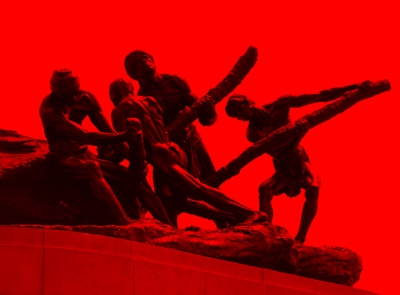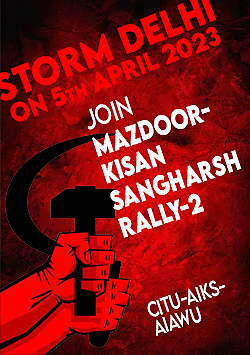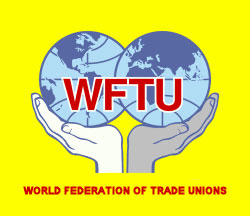Forward to the 14th Conference of CITU at Kannur
Towards Strengthening Unity and Countrywide Struggles!
CITU is getting ready for its 14th Conference, scheduled to be held in Kannur in Kerala on 4 - 8 April 2013. The 13th conference was held in Chandigarh on 17-21 March 2010.
This three year period was a period of great importance in the 43 years existence of CITU, for the organisation as well as for the working people of the country. This was a period when the working class of India has shown its capacity to unitedly fight on the demands of not only the workers but all the working people in the country. This was a period when the country witnessed an unprecedented unity of all the central trade unions and most of the national federations, which came together to fight on a common ten point charter of demands. In many states several regional and independent trade unions too joined in the campaigns and struggles further widening trade union unity.
For CITU, it was a step towards fulfilling the clarion call given at the time of its foundation Conference in May 1970.
Immediately after its formation, CITU started its efforts to turn its slogan ‘Unity and Struggle’, into a reality. These efforts received the support and solidarity of several organisations and resulted in the formation of various joint platforms including the United Council of Trade Unions (UTUC), the National Campaign Committee (NCC), the Sponsoring Committee of Indian Trade Unions and the National Platform of Mass Organisations. The joint movement was further broadened since 2009 achieving total unity of all the central trade unions and national federations.
Almost all these struggles were on issues concerning various sections of working people – for remunerative prices for the peasants, comprehensive law for the agricultural workers, for ensuring employment and unemployment relief to the youth – these were raised by the historic 19th January 1982 strike, the first of its kind in independent India.
From that country wide strike to the recent 48 hours General strike, the Trade Unions in the country have broken many a barriers and its importance and impact has already been noted by various sections.
As the General Secretary of the World Federation of Trade Unions (WFTU) George Mavrikos noted “The successful two day strike has been an important lesson for the international working class and a loud message to the Indian Government”.
It is a fact of the day, that not in many countries we have united actions by the central trade unions affiliated with ITUC, WFTU and those not affiliated with any international organisation. It is also a fact that not many would have even dreamed of a joint platform of all the Central TUs and National Federations in India considering the happenings during the past.
Each and every organisation, now involved in this joint movement has contributed in its own way in making this joint platform and struggles a reality.
For its part, CITU, true to the call from its foundation conference and its class orientation, has made all efforts to discharge its role with the necessary enthusiasm, initiative, commitment and dedication. Every member of CITU can be proud of that role.
Sectoral to National
In fact, the joint activities at various sectoral levels like steel, coal etc and by the CPSTU in the Central PSUs in general, played an important role in unifying the workers. Almost all the major sectors like electricity, transport, banks, insurance, defence production, telecom and government employees, saw united struggles at various levels including country wide sectoral strikes, during the last 30 years.
In the recent period the scheme workers like the anganwadi employees, ASHAs, mid day meal workers and others and the workers in the unorganised sector like beedi etc have also conducted united campaigns and struggles. This period also saw many a united struggles in various states.
These struggles have laid a firm foundation for lower level unity in the joint national struggles.
At the time of the 13th Conference, the present phase of united struggles had begun. The inaugural session of the 13th Conference in Chandigarh, witnessed the reiteration of strengthening united struggles by various central TUs.
Immediately after the Conference, the decision to go for a countrywide strike on a five point charter of demands was taken. The strike on 7th September 2010, incidentally, coincided with the International Day of Action called by WFTU, resulting in strikes and struggles in different parts of the world.
Last 3 years saw two more general strikes – on 28th February 2012 and on 20-21 February 2013. In between, we witnessed the largest mobilisation of workers for a Parliament March on 23rd February 2011 and again another March on 20th December. Large scale demonstrations, dharnas and Jail Bharo were also organised. There were many sectoral strikes also during this period, including few countrywide strike actions.
CITU, carrying forward the decisions of the 13th Conference played an effective role in all these struggles – national, state and at work spot level.
CITU has taken the message of unity and struggle to every nook and corner of the country. The improvement in carrying the message of unity down to grass root level has been noted during the successful 48 hours strike.
Independent movements
CITU unions and federations and also committees at various levels, took up many issues independently and conducted militant strikes and struggles. The struggles for trade union rights especially in MNCs indifferent parts of the country conducted during the last 3 years, are of great importance and notable successes have been attained in this and also on economic demands of those workers. This period also saw democratic rights of the workers and the people in general being trampled by various governments and workers militantly resisting these attacks.
CITU leaders and also workers, both men and women, faced physical attacks from police, goondas, had cases foisted on them and put in jail. There were large scale victimisations in different parts of the country. CITU could fight back effectively in many centres, often with the solidarity and support of fraternal trade unions and mass organisations. Many a local struggles, in organised, unorganised sectors and by the scheme workers were conducted in different states.
The country wide one day strike by construction workers led by CWFI in November 2012 was an important struggle in the unorganised sector. The two days’ mahapadav of the scheme workers organised by CITU, in New Delhi in November 2012, witnessed massive mobilisation, especially of women workers, creating more confidence and fighting spirit not only among the participants but also among the CITU movement as a whole.
International Tasks
It was during this period that CITU got formally affiliated to WFTU and has also taken up certain organisational responsibilities.
CITU’s tradition of upholding the banner of international solidarity is being carried forward, despite many a limitations and difficulties.
Critical period
The period after the last Conference was also politically critical to the working people. Chandigarh Conference was within a year of the 2009 general elections, in which the Left parties faced a set back. In the assembly elections, Left lost both West Bengal and Kerala. We saw a belligerent UPA II going ahead with its neo-liberal agenda and the main opposition party, BJP, generally supporting the Government on these policy matters. Almost all the state governments, though led by different political parties of national and regional status, also followed these disastrous policies.
West Bengal witnessed murderous attacks on the trade unions and on the cadres and leaders of the left and democratic movement. The effect of so called `paribortan’ is new being experienced by everybody with the whole democratic system under attack.
It was in such a critical situation, that the trade unions could successfully build up a united movement, challenging the neo-liberal policies and demanding a change in these policies towards an alternative set of policies. Trade Unions could put the policy issues and also the peoples’ demands on focus.
The unprecedented mobilisation of various sections of people protesting against corruption, attacks on women etc., and demanding justice to various sections are notable developments. Added to these are the impact of the 48 hours general strike, which received massive support of ordinary people in urban and rural centres.
All these are the reflections of the urge among masses for a change. These have to be properly channelised into a mass movement and it is here, the Trade Unions should play a leading role.
All these mobilisations, mass movements and successes attained in various struggles and also the victory of the left front in Tripura, leading to the formation of the seventh LF government form the background of the ensuing 14th Conference.
All these are happening at a time, when the capitalist system is engulfed in an unprecedented crisis. This was noted in the Chandigarh Conference and the crisis has further deepened after that.
The working class, all over the world, in all the continents is on the move, struggling against the denial of even its existing rights and benefits resulting in serious attacks on livelihood of the working people. The increasing disparities all over the world resulted in the now famous slogan `99 percent Vs One percent!’
Despite the severe attacks and serious problems even in day to day functioning of trade unions in many parts of West Bengal, CITU has improved its over all strength after the last Conference. Though there are many a weaknesses still persisting in different areas, CITU is marching ahead.
The Kannur Conference will be discussing all the issues of importance to the working people of the country and also going into various aspects of organisational growth of CITU. This conference will pave the way for further strengthening the united activities and struggles of working class and also other sections of toiling masses!
A.K. Padmanabhan



